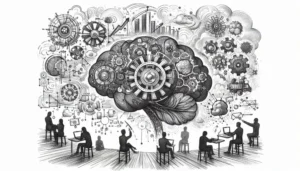Content psychology is the study of how people perceive, process, and respond to content. Every piece of content is not just passively consumed — it interacts with a reader’s emotions, cognitive biases, and personal experiences. By leveraging principles of psychology, content creators can craft messages that resonate deeply, increasing engagement and conversions.
Whether you’re a marketer, writer, or strategist working with a content psychology agency, understanding how users interpret content can help you develop more compelling and effective messaging.
The Role of Cognitive Processing in Content Interpretation

The human brain is constantly filtering and interpreting information. Content is not just absorbed at face value; it is processed through cognitive mechanisms such as attention, memory, and perception. These cognitive processes dictate how content is understood and retained.
- Attention: In a digital landscape filled with distractions, grabbing and holding a reader’s attention is crucial. Shorter paragraphs, bullet points, and compelling headlines help sustain focus.
- Memory: Repetition and association improve recall. Content that references familiar ideas or previous experiences is more likely to be remembered.
- Perception: Different people interpret content in unique ways based on their past experiences, biases, and cultural backgrounds. A content psychology agency in Malaysia, for instance, would craft messaging that aligns with local perceptions and values.
The Science of Emotional Triggers in Content Engagement
Emotions play a pivotal role in content engagement. Whether positive or negative, strong emotional responses make content more memorable and shareable.
How Emotional Responses Drive Engagement
- Positive emotions (joy, surprise, excitement) encourage social sharing and interaction.
- Negative emotions (fear, anger, frustration) can also boost engagement but should be used carefully to avoid audience fatigue.
- Authenticity matters—forced emotional triggers can backfire if they come across as manipulative.
- Relevance enhances impact—content must align with audience values and concerns.
Example:
A study in content psychology found that emotionally charged headlines receive higher engagement rates. A title like “How to Create Viral Content Using Psychological Triggers” is likely to perform better than a generic one like “Content Marketing Tips.”
Socio-Cultural Factors in Content Consumption
Socio-cultural influences shape how content is perceived and interacted with. Cultural norms, language, and social trends determine which types of content resonate with specific audiences.
- Language & Tone: A content psychology agency in Malaysia would tailor messaging to reflect local slang, formalities, and communication styles.
- Medium Preference: Some cultures prefer visual content over text-heavy articles.
- Social Influence: Word-of-mouth and influencer recommendations significantly impact content effectiveness in certain regions.
Understanding these factors ensures that your content is both relatable and culturally relevant.
5 Psychological Insights to Improve Content Effectiveness

Applying psychological principles to content strategy can enhance its impact. Here are five actionable insights:
1. Leverage the FOMO Effect (Fear of Missing Out)
People don’t want to miss out on valuable opportunities. Use phrases like:
- “Limited-time offer“
- “Exclusive insights only for subscribers”
- “Join 10,000+ people who have benefited”
2. Apply the Mere Exposure Effect
The more people see your content, the more they trust it. Repetition builds familiarity and credibility. Repurpose content across multiple platforms to reinforce key messages.
3. Use Storytelling to Create Emotional Connections
People remember stories better than facts. Instead of stating data, frame it in a relatable way:
- Before: “Our product increases productivity by 30%.”
- After: “Sarah struggled with time management until she discovered our tool—now she gets more done in less time.”
4. Implement Cognitive Load Reduction
Make content easier to process by:
- Using bullet points and short paragraphs
- Incorporating visuals and infographics
- Avoiding jargon and complex language
5. Utilise Social Proof to Build Trust
People are more likely to trust content that others endorse. Include:
- Testimonials and case studies
- User-generated content
- Engagement metrics (e.g., “Over 5,000 shares”)
Applying Behavioural Theories to Content Strategy
Behavioural psychology offers insights into how people interact with content and make decisions. Some key theories include:
- Social Learning Theory: People mimic behaviours they see in others. Featuring relatable figures in your content increases its effectiveness.
- Loss Aversion: People fear losing something more than they desire to gain something. Framing content around what users stand to lose can drive stronger engagement.
- Cognitive Dissonance: When people hold conflicting beliefs, they seek information that aligns with their existing views. Aligning content with audience beliefs enhances reliability.
Conclusion
Understanding content psychology isn’t just a marketing advantage—it’s essential for creating content that resonates, engages, and converts. By incorporating cognitive and emotional insights, leveraging social and cultural factors, and applying behavioural theories, content creators can craft messages that drive meaningful engagement.
Whether you’re working with a content psychology agency or refining your own content strategy, applying these principles will ensure your message reaches and influences the right audience.
📢 Need content that truly connects with your audience? Partner with Paperballad today, the experts in content psychology-driven storytelling!
Content Psychology FAQs
- What is content psychology, and why is it important?
Content psychology is the study of how people perceive, process, and respond to content. It helps marketers create more engaging, persuasive, and effective content. - How does cognitive processing affect content engagement?
Cognitive factors like attention, memory, and perception determine how well content is absorbed and retained. Structuring content for easy comprehension enhances engagement. - Why do emotions play a key role in content success?
Emotionally charged content is more memorable and shareable. Positive emotions encourage interaction, while negative emotions can drive urgency or discussion. - How do socio-cultural factors influence content marketing?
Cultural norms, values, and language impact how content is interpreted. Understanding these factors ensures relevance and deeper audience connections. - What psychological techniques improve content effectiveness?
Techniques like storytelling, social proof, FOMO, and cognitive load reduction enhance content appeal and drive engagement.















